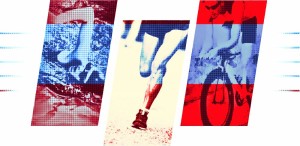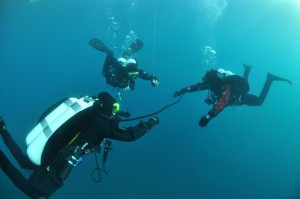Sorry, this entry is only available in Magyar.
Sorry, this entry is only available in Magyar.
To be in a good form and to dive – in other words: do we have to do sports regularly if we want to dive? Those who apply to GUE Fundamentals course usually ask what physical conditions they need to correspond. Although there is not any written rule for this, it worth preparing because the course is quite a big physical challenge for many people.
 One of the most frequent problems is the cramp of the leg muscles. To avoid this problem it would be useful to do some exercises that move those muscles that we do not really use in our every day life. It can also be useful to maintain the hydration (provide enough water) of our body at a good level.
One of the most frequent problems is the cramp of the leg muscles. To avoid this problem it would be useful to do some exercises that move those muscles that we do not really use in our every day life. It can also be useful to maintain the hydration (provide enough water) of our body at a good level.
What could be the recommended form of exercises? I would suggest running, swimming and cycling.
Running might be the most simple. You can run anywhere and you do not need anything but a pair of appropriate shoes. You burn lots of calories, it has good effects on the lungs, the circulation and the cardiovascular system. Running regularly helps the diver’s lungs to filter gases and to accumulate less carbon dioxide during descents. Also the diver will carry his equipment more easily and his kicks will become a lot efficient. Unfortunately many people say that they cannot run beacuse it makes their knees hurt. It is often caused by the improper running technique or the inappropriate shoes or maybe the too much running for the first time. So if we start running let’s start it with lower intensity, shorter distances and periods and only raise charging step by step. At the beginning do not run more than 30 minutes. Warm up is an essential part of proper running technique. A few minutes walk is perfectly enough for this. During running we have to pay attention not to run on our heels, because it charges the knees a lot. Instead of running on our heels try to land on the middle of our sole. Check the sole of our shoes, because it helps acquiring the proper technique. It can be seen which part we tear more intensively. Try to make the abrasion more even. Other useful thing is to glance at our sole too. Is it flat or curved? Try to choose shoes that fit our feet.
Swimming is not only useful in a physical sense but it also helps increase our self-confidence in water. It is not among the expensive sports and it also burns a lot of calories and has good effects on the cardiovascular system. Unfortunately there are a lot of divers who swim poorly and that causes a great dependence from the equipment, that is why a swim test is a crucial part of every GUE course. We often say at GUE that slow is smooth and smooth is fast. This is also true for swimming, that is, with slow but well-done movements we can reach a high speed. During swimming try to keep rests, warm ourselves up and do not try to swim too much at one go.
Although cycling is a great form of recreation, but it has much smaller contribution to diving than running does. As it strengthen the calves, it has a good effect on kickings and it also strengthen the muscles of the neck which helps to form a horizontal position.
Basically, GUE Fundamentals course is not too charging, but a previous physical preparation will be multiply refunded. The student’s capacity will be better and learning will be more enjoyable. And these are just the basics. Higher level trainings need higher level physical preparation.
As a start and as a practise for me to get better in blogging, I sum up the meanings of GUE courses abbreviations. You can read about these courses under „Course types” menu.
Tech = Technical
Rec = Recreational
Cave = Cave
Fundamentals = Fundamentals
DPV = Diving Propulsion Vehicle
I feel that I will be able to manage this blog. I hope I could help you 🙂
What makes GUE’s training system that special?
GUE is not just a training system but a scuba diving organization that trains divers to achieve its goals. Compared to other trainig systems, GUE standards are way more rigorous than the others’. But the main point is not just that, since other organizations also have their own written standards. The essential thing is that GUE instructors are under very strong control to keep the standards. Moreover we, instructors, are specialy trained.
After „Fundamentals” instructor training there are no more classic instructor courses, because GUE created a mentoral system to train their instructors. The candidates join one, two or sometimes three leader instructors and they practice on their real courses, on real students. That is how they learn and gain training experiences.
All in all, it is not in practice at GUE to do one week „from zero-to-hero” instructor courses, especially not when it is about e.g. cave instructors. But I will write about it later.







